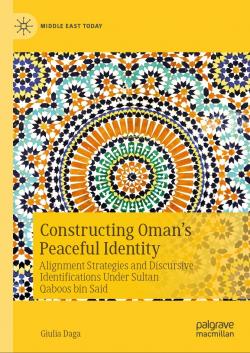Constructing Oman’s Peaceful Identity. Alignment Strategies and Discursive Identifications Under Sultan Qaboos bin Said

This book offers a comprehensive and insightful exploration of Oman’s discourses on foreign policy and national identity in the context of the Middle East. The Sultanate of Oman is often hailed as a peaceful exception in the region, but this work goes beyond surface-level observations to reveal the intricate complexities of Oman’s foreign policy and identity construction. With a keen focus on deconstructing essentialist understandings, the chapters delve into how discursive alignments and identity contents have shaped the government’s quest for legitimacy, recognition, and status. Employing a pioneering discourse historical approach to compare the National Day speeches and UN General Assembly speeches throughout Sultan Qaboos bin Said Al Bu Saidi’s reign (1970–2020), the author reveals how discourse evolved based on time, issues, and audiences. Notably, the book situates Oman within the context of the Gulf Cooperation Council states, examining how the Omani government’s interlinked discourses on identity and foreign policy contributed to differentiate the Sultanate from other Gulf countries. With chapters exploring Oman’s foreign policy principles, its material and ideological response to the ideas linked to the Dhofar Revolution, and its interactions with the Arab world and the international community, readers of this book will gain a comprehensive understanding of Oman’s evolving national and supranational identifications and the dynamic nature of its foreign policy. Challenging prevailing narratives while providing a fresh perspective on the relations between Oman’s foreign policy and identity construction, this book marks an important text for scholars as well as policymakers and anyone interested in understanding the intricate dynamics of Oman’s role in the global stage.
1 Introduction
1.1 A Brief History of Oman
1.1.1 The Imamate and the Sultanate
1.1.2 The British Role and Forms of Contention Against the Sultanate
1.1.3 The Reign of Sultan Qaboos Bin Said (1970–2020)
1.2 A Revised Discourse-Historical Approach
1.3 Book Overview
Part I Oman’s Foreign Policy and Identity: Embracing Complexity
2 Representations of Oman’s (Non)Alignment Strategies and National Identity
2.1 Multiple Definitions of Oman’s Alignment Strategies
2.2 Oman’s Peacefulness: A Contested Representation
2.2.1 The Official Narrative: A Peaceful Foreign Policy and Identity
2.2.2 Reinforcing the Official Narrative: Stories of Unity, Cosmopolitanism, and Religious Tolerance
2.2.3 Contesting the Official Narrative: Stories of Fragmentation, Instrumentality, and Religious Rigidity
Part II Forgetting the Imamate and Dhofar
3 Legitimising the Coup (1970–1976)
3.1 Building a Nation in the Background of War
3.2 Constructing Legitimacy: Domestic Progress
3.2.1 Mythopoesis: Creating a Common Present and Future
3.2.2 Mythopoesis: Creating a Common Past
3.2.3 Responsibilisation
3.2.4 Authorisation
3.2.5 Rationalisation
3.2.6 Altruism
3.3 Delegitimising the “Other”: The Dhofar Revolution
3.3.1 Criminalisation
3.3.2 Minimisation/Downgrading
3.3.3 Legal and Religious Delegitimation
3.4 The New Contours of an Omani National Identity
3.5 The Renaissance Narrative Beyond Sultan Qaboos: Sultan Haitham’s ‘Renewed Renaissance’
4 Constructing Oman’s Regional Role
4.1 Joining the Arab World
4.2 Oman and the Arab Identification
4.3 The Arab–Israeli/Israeli-Palestinian Conflict
4.4 The Iran-Iraq War
4.5 Post-war Iraq
4.6 Post-war Iran
4.7 Objective-Based Identifications
5 A Twirling Path Towards ‘Nonalignment’ in Oman’s International Role
5.1 Joining the International Community
5.2 The Principle of Non-Interference and the NAM Membership
5.3 A Nonaligned and Anticolonial Country: The International Audience
5.4 The Other Side of the Coin: An Anti-Communist Country at Home
5.5 Non-Interference and Neutrality Contested: Remnants of a Counter-Discourse
5.6 A Pragmatic Understanding of Peace
Part III Promoting Discourses of Peacefulness
6 Normative Peace and Religious Tolerance in Oman’s Official Discourse
6.1 A Normative Understanding of Peace
6.2 The ‘Small-But-Good’ Narrative
6.2.1 International Development and Disarmament
6.2.2 Law of the Sea and Environmental Protection
6.3 Peace Entrepreneurship in Post-2011 Regional Conflicts
6.4 Discourses on Tolerance
6.4.1 The Discourse on Terrorism and Radicalism
6.5 Nation Branding and Oman’s Tourism Strategy
6.5.1 A Successful Branding?
7 Oman’s Evolving Discursive Alignments and Identifications
7.1 Evolving Alignments and Identifications
7.2 Interpreting Oman’s Alignments and Identifications
7.3 Identity Construction
7.4 Regime Survival and Legitimation
7.5 Status-Seeking and Nation Branding
7.6 A Methodological Framework to Analyse Identifications and Alignments
7.7 Final Remarks
Appendix
References


